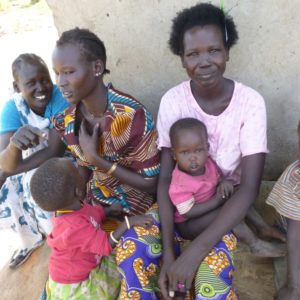Part 2: Family
In the first article in our series on recognizing the barriers to girls’ education in South Sudan, we identified four spheres of society in which barriers are present: family, school, community, and national. In this post, we will take a look at the family sphere and the barriers most closely associated with it. This helps us to develop effective interventions.
As we know, family and household circumstances significantly influence a child’s performance in school, no matter where you are. In South Sudan, however, such circumstances often create barriers that prevent children, especially girls, from attending school. The most of these are:
- Cost of attending school
- Domestic duties and childhood marriage
- Gender-differentiated parenting practices
Cost of Attending School
Poverty is endemic in South Sudan, with at least 80% of the population defined as income-poor and living on the equivalent of less than US$1 per day. School is unaffordable, especially in rural areas. In 2015, 15% of girls in South Sudan dropped out of secondary school due to inability to pay fees. Other school-related costs that are barriers to attendance include transportation, meals, and uniforms.Africa ELI’s central program is academic scholarships. Our scholarships pay for school tuition and most other school related costs, including supplies, uniforms, and dormitory requirements.
Domestic Duties and Childhood Marriage
Domestic work, such as cooking for the family, is a major issue that affects the classroom performance of many girls, and may eventually force them to leave school. Generally, in South Sudan, daughters are expected to stay home and cook, clean, and perform other domestic duties, while sons attend school. This is especially true at the secondary school level.
A protective measure that Africa ELI takes to reduce the chances that domestic pressures will negatively impact our students’ education is to enroll them in boarding schools. This keeps them away from domestic pressures while they are receiving their education. Once enrolled, our priority is to ensure that their enrollment does not lapse. When it does lapse for unexpected reasons, such as the recent forced migration of many of our students, we deploy our staff in South Sudan to get them re-enrolled as quickly as possible.
An issue closely connected to the impact of family and domestic factors is that of childhood marriage. Fifty-two percent of girls in South Sudan are married by the age of 18. Once married, they commonly abandon their education in order to assume a domestic role within their husband’s family. Driving factors for childhood marriage include social instability and high levels of poverty. By robbing girls of their potential, childhood marriage denies families, communities, and the nation of South Sudan itself the contributions these girls might have made as women. It is a problem rooted in many levels of South Sudanese culture and society, and, as such, it will come up again in this series.
Gender-differentiated Parenting Practices
Seventy-three percent of men and 85% of women in South Sudan suffer from illiteracy. As a result, many parents view education as irrelevant or in opposition to accepted societal roles.
The content of educational material reinforces gender stereotype, thereby perpetuating discrimination. In response to this, Africa ELI implements the following interventions:
- Enrolling students in mixed boarding schools so as to raise awareness among males about the importance of equal opportunities for girls and to promote the role of boys as allies for girls education.
- Participating in PTA meetings so as to further promote “education for all.”
As funding allows, the following gender-friendly programs are coordinated and funded by Africa ELI:
- Cultural days with dancing
- Radio debate programs
- Life-skills programming for girls and boys
It is important that we recognize and identify the barriers that are present within the family sphere. By doing so, we are better able to develop and implement effective interventions. However, it is also important to recognize that our students often do receive support from their families. We have spoken to and worked with a number of parents who value education and desire one for their daughters as well as their sons.
References
African Independent, 2016
The Christian Science Monitor, 2017
Girls Not Brides, 2017
Gurtong, 2013
Institute for Educational Planning, 2016
International Institute for Educational Planning, 2016
UNICEF, 2016





